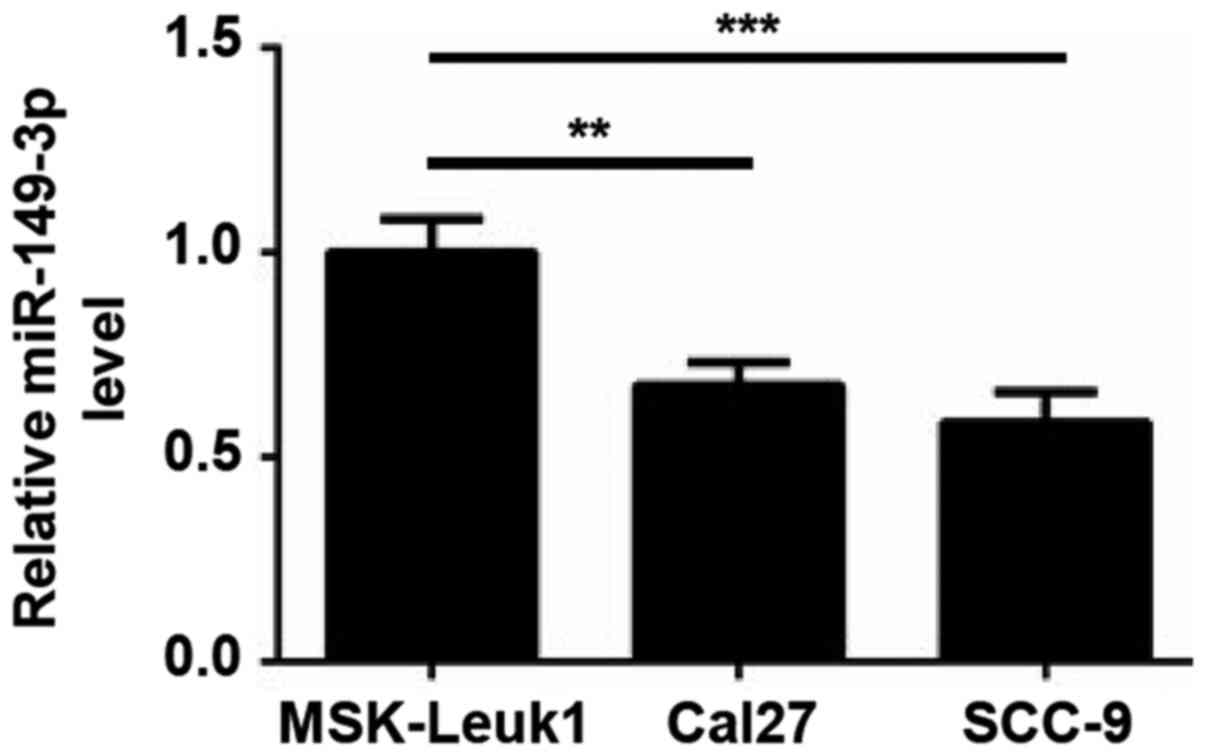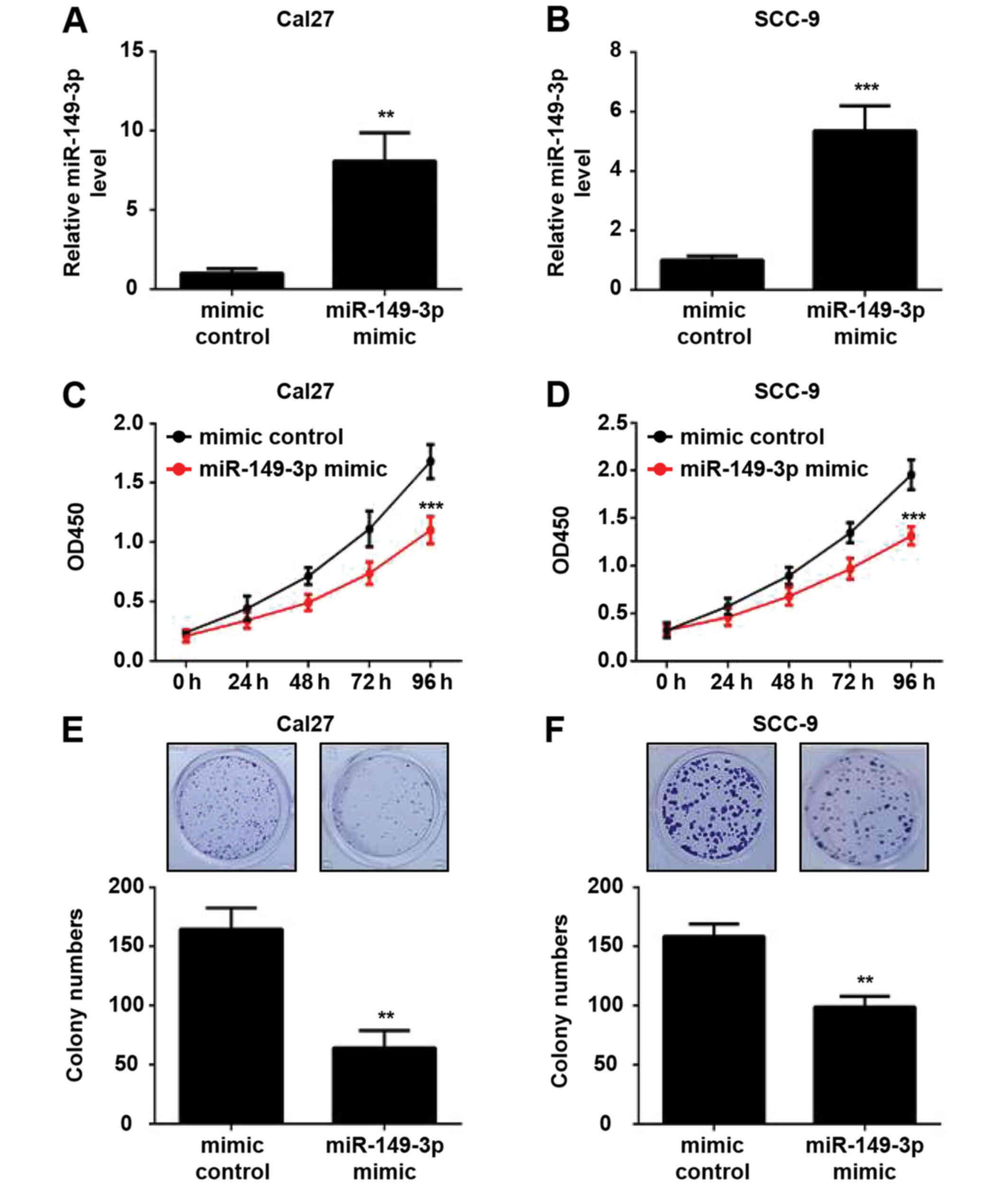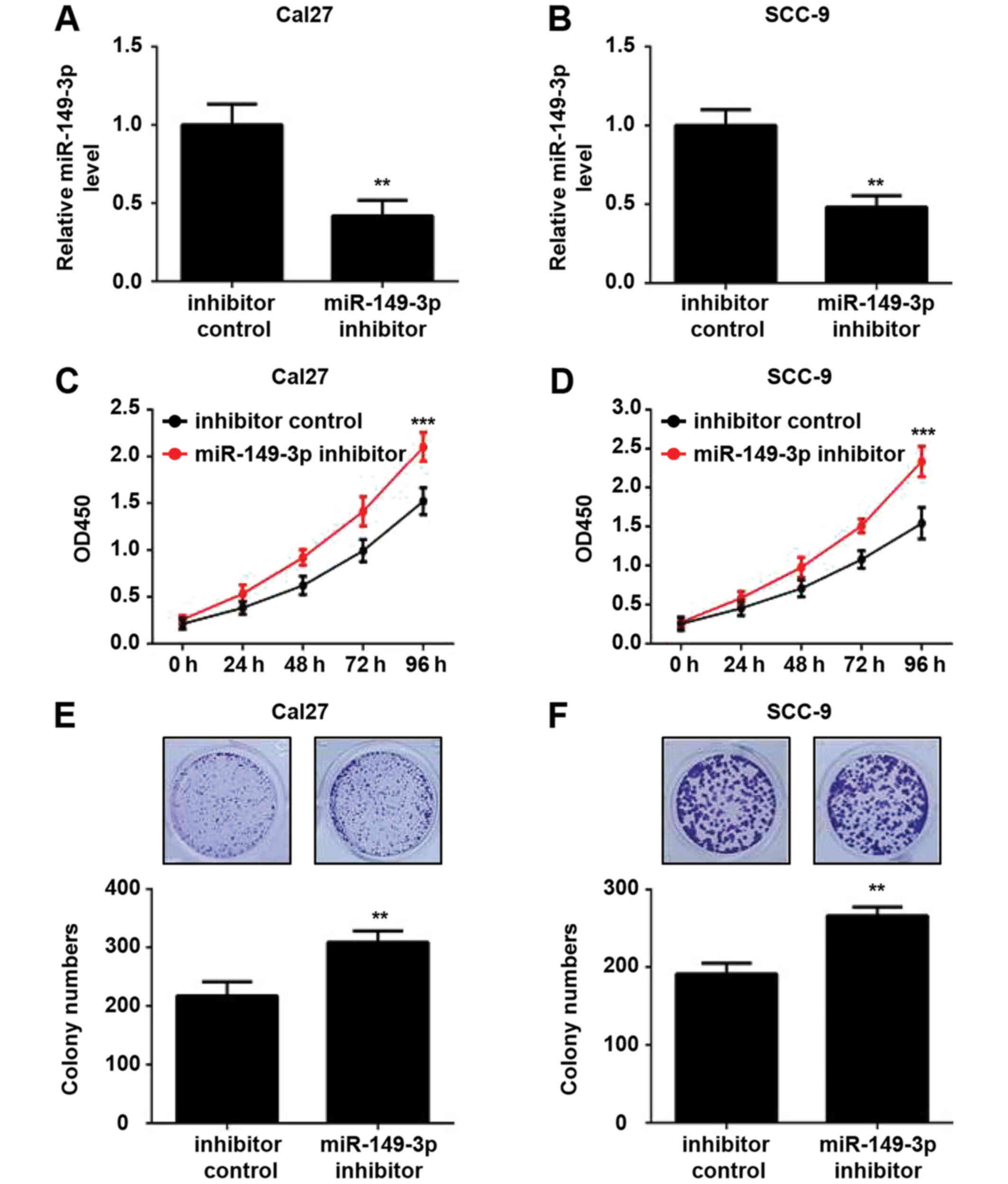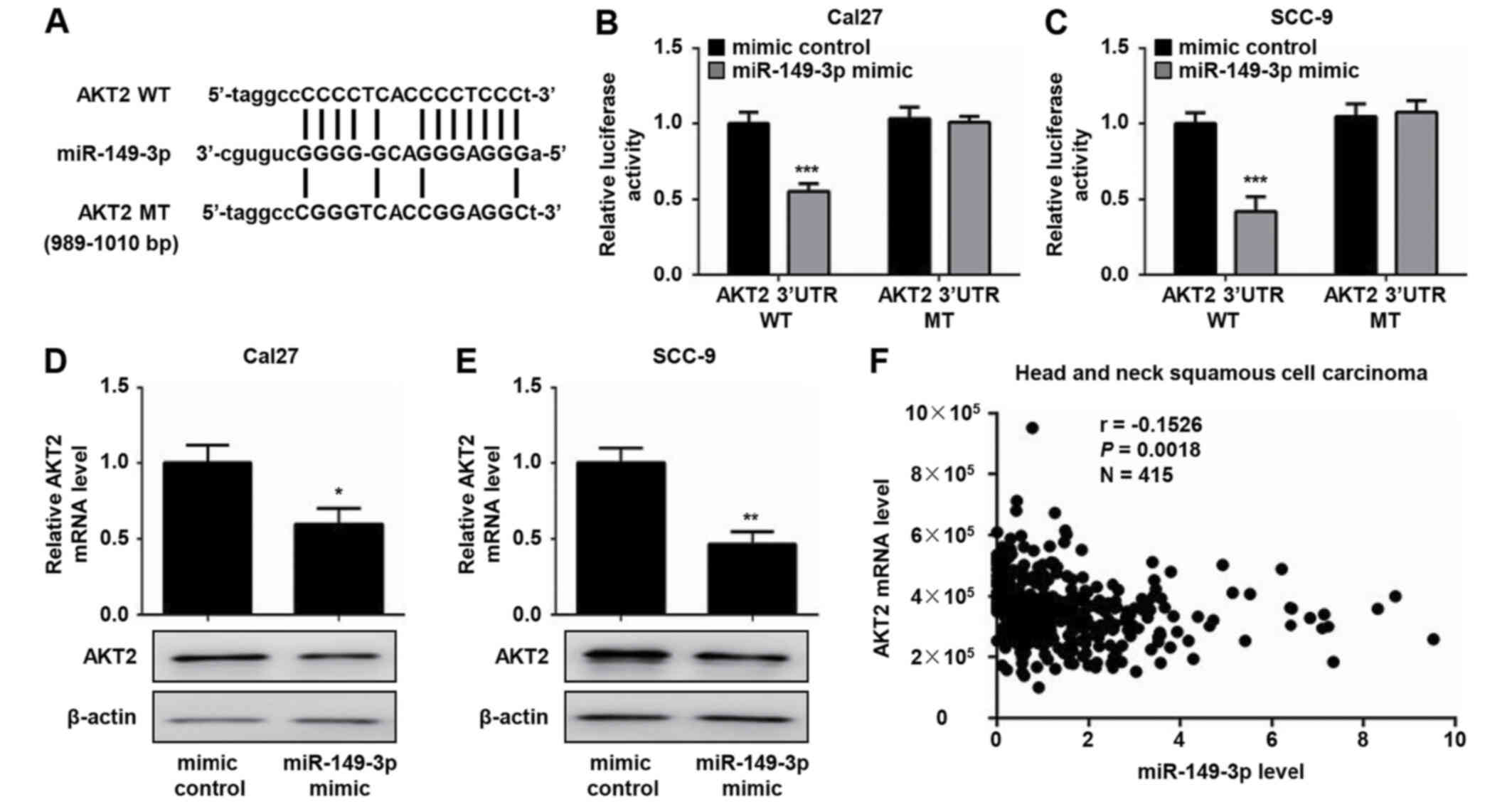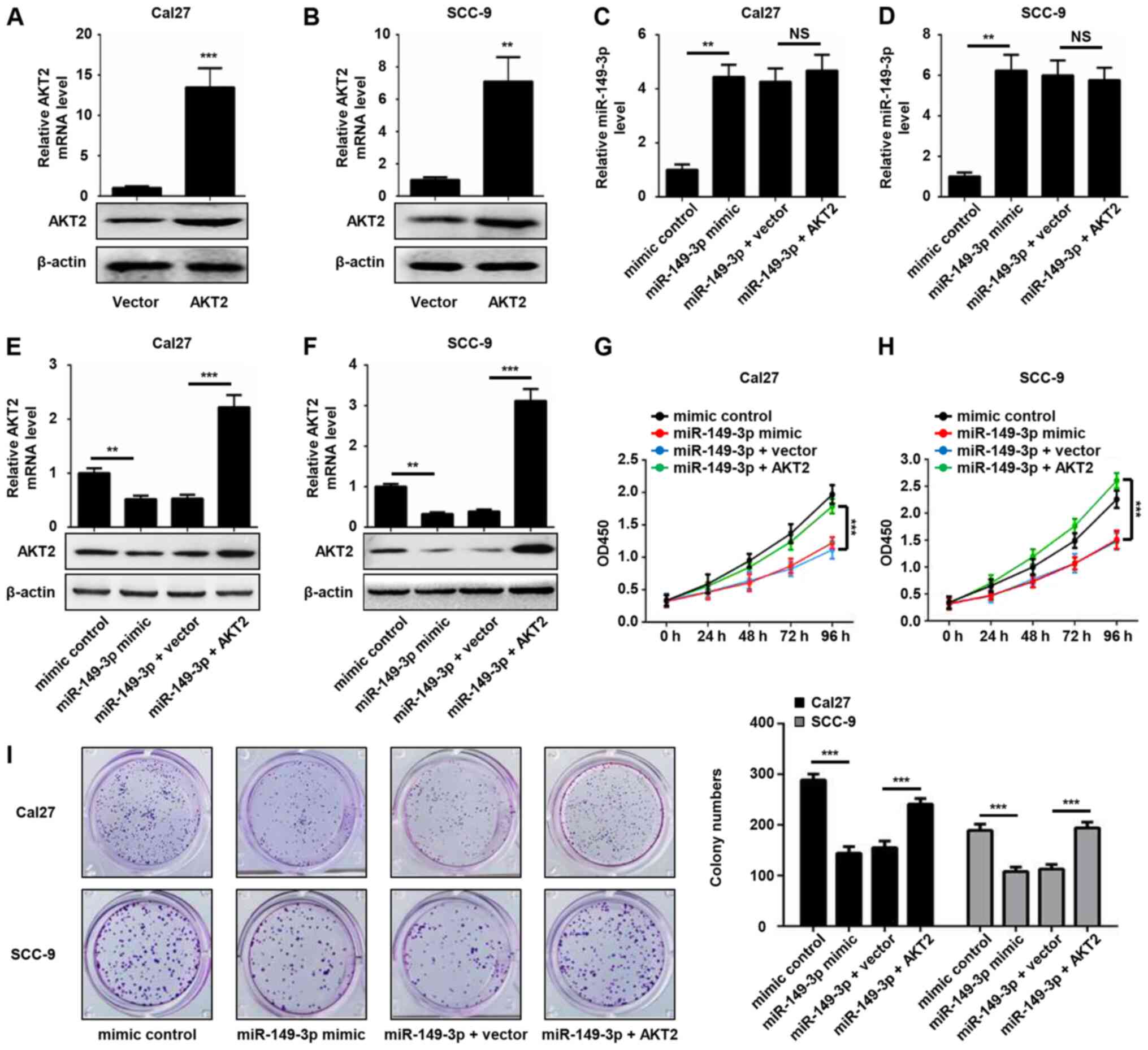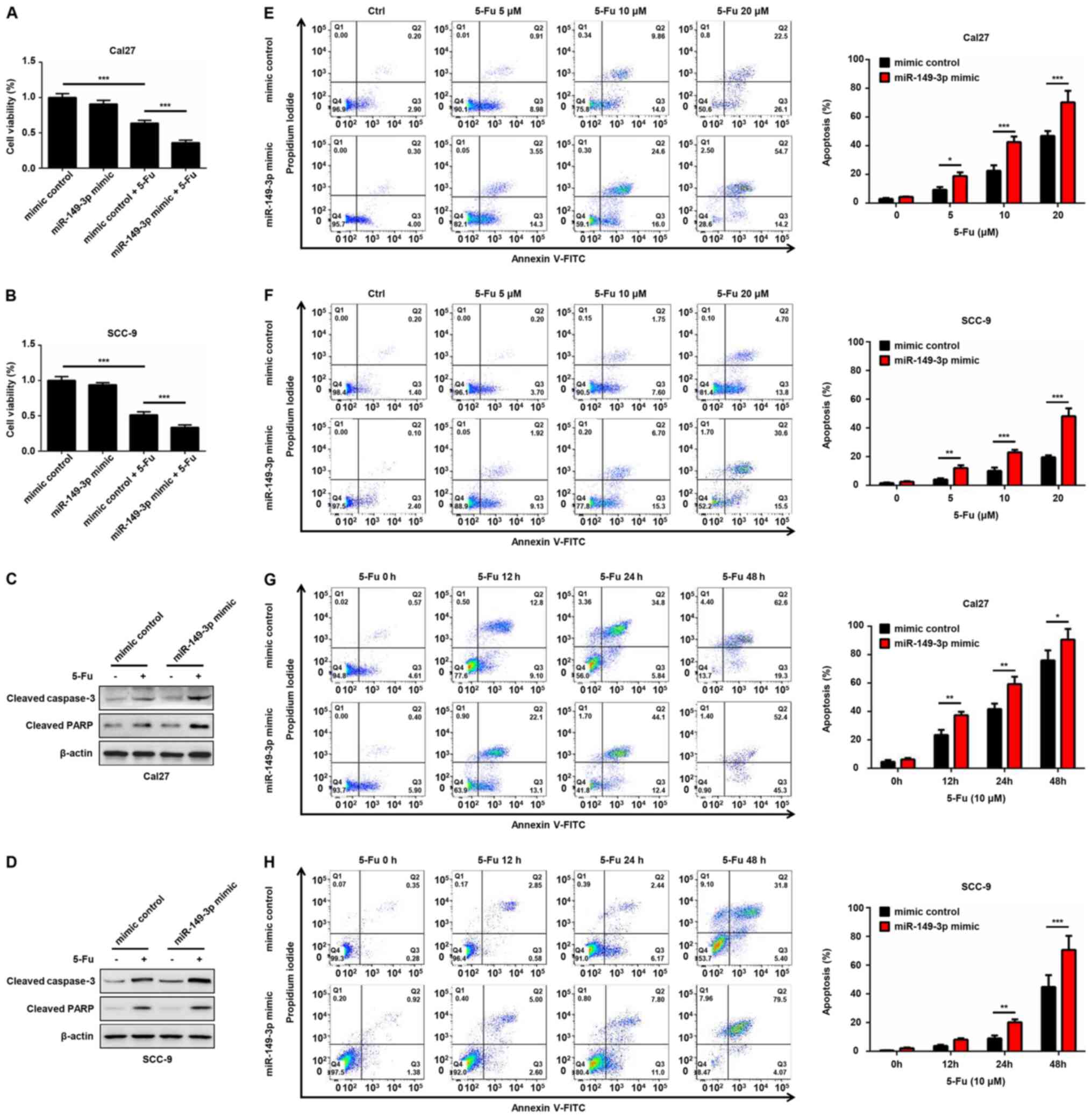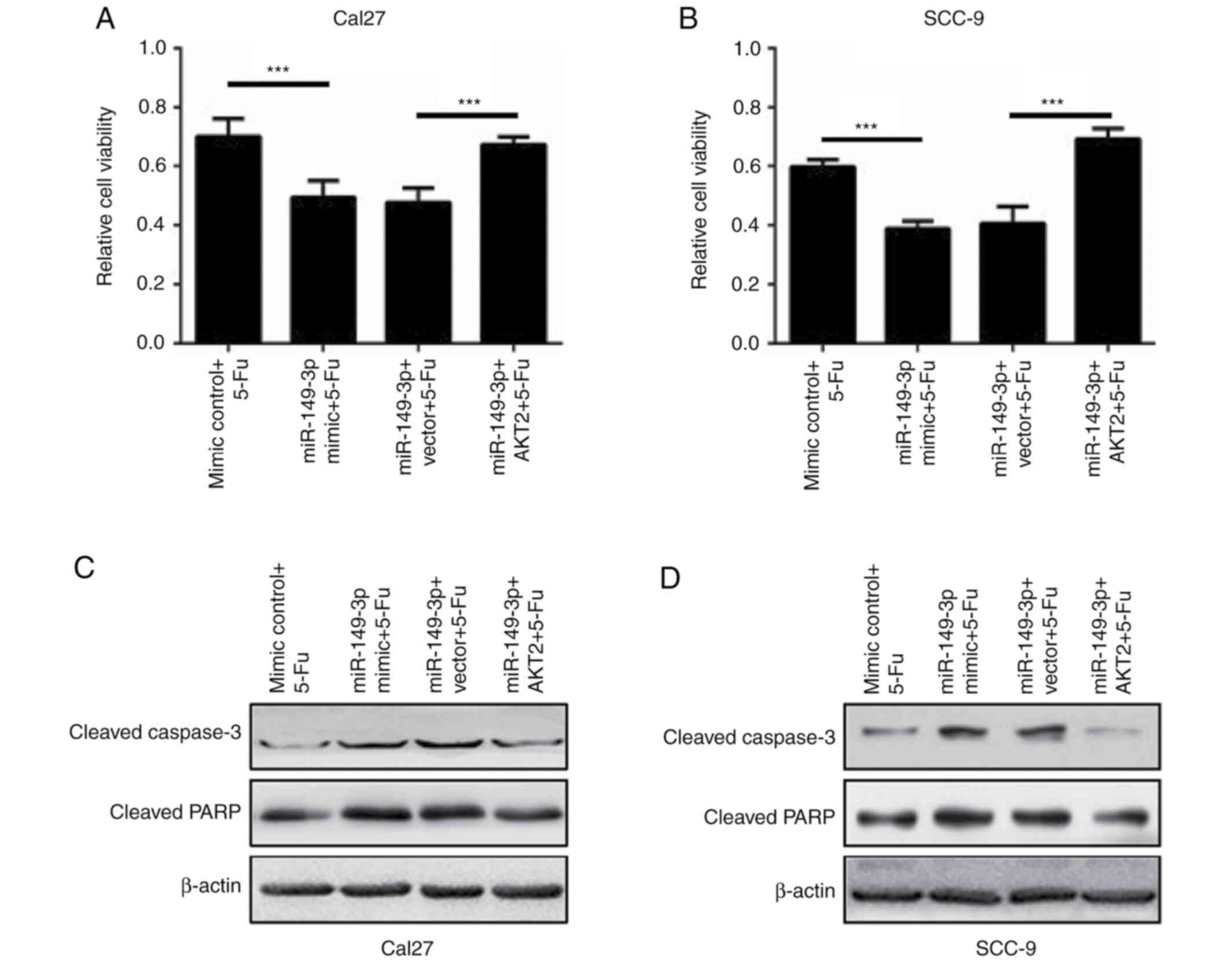|
1
|
Siegel RL, Miller KD and Jemal A: Cancer
statistics, 2018. CA Cancer J Clin. 68:7–30. 2018. View Article : Google Scholar : PubMed/NCBI
|
|
2
|
Iamaroon A and Krisanaprakornkit S:
Overexpression and activation of Akt2 protein in oral squamous cell
carcinoma. Oral Oncol. 45:e175–e179. 2009. View Article : Google Scholar : PubMed/NCBI
|
|
3
|
Leemans CR, Braakhuis BJ and Brakenhoff
RH: The molecular biology of head and neck cancer. Nat Rev Cancer.
11:9–22. 2011. View
Article : Google Scholar : PubMed/NCBI
|
|
4
|
Carvalho AL, Nishimoto IN, Califano JA and
Kowalski LP: Trends in incidence and prognosis for head and neck
cancer in the United States: A site-specific analysis of the SEER
database. Int J Cancer. 114:806–816. 2005. View Article : Google Scholar : PubMed/NCBI
|
|
5
|
Rupaimoole R and Slack FJ: MicroRNA
therapeutics: Towards a new era for the management of cancer and
other diseases. Nat Rev Drug Discov. 16:203–222. 2017. View Article : Google Scholar : PubMed/NCBI
|
|
6
|
Gebert LFR and MacRae IJ: Regulation of
microRNA function in animals. Nat Rev Mol Cell Biol. 20:21–37.
2019. View Article : Google Scholar : PubMed/NCBI
|
|
7
|
Nishiwada S, Sho M, Banwait JK, Yamamura
K, Akahori T, Nakamura K, Baba H and Goel A: A microRNA signature
identifies pancreatic ductal adenocarcinoma patients at risk for
lymph node metastases. Gastroenterology. 159:562–574. 2020.
View Article : Google Scholar : PubMed/NCBI
|
|
8
|
Zhao M, Hou Y, Du YE, Yang L, Qin Y, Peng
M, Liu S, Wan X, Qiao Y, Zeng H, et al: Drosha-independent
miR-6778-5p strengthens gastric cancer stem cell stemness via
regulation of cytosolic one-carbon folate metabolism. Cancer Lett.
478:8–21. 2020. View Article : Google Scholar : PubMed/NCBI
|
|
9
|
Xu Y, Ji K, Wu M, Hao B, Yao KT and Xu Y:
A miRNA-HERC4 pathway promotes breast tumorigenesis by inactivating
tumor suppressor LATS1. Protein Cell. 10:595–605. 2019. View Article : Google Scholar : PubMed/NCBI
|
|
10
|
Shin CH, Lee H, Kim HR, Choi KH, Joung JG
and Kim HH: Regulation of PLK1 through competition between hnRNPK,
miR-149-3p and miR-193b-5p. Cell Death Differ. 24:1861–1871. 2017.
View Article : Google Scholar : PubMed/NCBI
|
|
11
|
Yang D, Du G, Xu A, Xi X and Li D:
Expression of miR-149-3p inhibits proliferation, migration, and
invasion of bladder cancer by targeting S100A4. Am J Cancer Res.
7:2209–2219. 2017.PubMed/NCBI
|
|
12
|
Zhang M, Gao D, Shi Y, Wang Y, Joshi R, Yu
Q, Liu D, Alotaibi F, Zhang Y, Wang H, et al: miR-149-3p reverses
CD8+ T-cell exhaustion by reducing inhibitory receptors and
promoting cytokine secretion in breast cancer cells. Open Biol.
9:1900612019. View Article : Google Scholar : PubMed/NCBI
|
|
13
|
Bellazzo A, Di Minin G, Valentino E,
Sicari D, Torre D, Marchionni L, Serpi F, Stadler MB, Taverna D,
Zuccolotto G, et al: Cell-autonomous and cell non-autonomous
downregulation of tumor suppressor DAB2IP by microRNA-149-3p
promotes aggressiveness of cancer cells. Cell Death Differ.
25:1224–1238. 2018. View Article : Google Scholar : PubMed/NCBI
|
|
14
|
Livak KJ and Schmittgen TD: Analysis of
relative gene expression data using real-time quantitative PCR and
the 2(-Delta Delta C(T)) Method. Methods. 25:402–408. 2001.
View Article : Google Scholar : PubMed/NCBI
|
|
15
|
Cancer Genome Atlas Network: Comprehensive
genomic characterization of head and neck squamous cell carcinomas.
Nature. 517:576–582. 2015. View Article : Google Scholar : PubMed/NCBI
|
|
16
|
Gonzalez E and McGraw TE: The Akt kinases:
Isoform specificity in metabolism and cancer. Cell Cycle.
8:2502–2508. 2009. View Article : Google Scholar : PubMed/NCBI
|
|
17
|
Hers I, Vincent EE and Tavaré JM: Akt
signalling in health and disease. Cell Signal. 23:1515–1527. 2011.
View Article : Google Scholar : PubMed/NCBI
|
|
18
|
Lin S and Gregory RI: MicroRNA biogenesis
pathways in cancer. Nat Rev Cancer. 15:321–333. 2015. View Article : Google Scholar : PubMed/NCBI
|
|
19
|
Bartel DP: MicroRNAs: Target recognition
and regulatory functions. Cell. 136:215–233. 2009. View Article : Google Scholar : PubMed/NCBI
|
|
20
|
Sugawara S, Yamada Y, Arai T, Okato A,
Idichi T, Kato M, Koshizuka K, Ichikawa T and Seki N: Dual strands
of the miR-223 duplex (miR-223-5p and miR-223-3p) inhibit cancer
cell aggressiveness: Targeted genes are involved in bladder cancer
pathogenesis. J Hum Genet. 63:657–668. 2018. View Article : Google Scholar : PubMed/NCBI
|
|
21
|
Okato A, Arai T, Kojima S, Koshizuka K,
Osako Y, Idichi T, Kurozumi A, Goto Y, Kato M, Naya Y, et al: Dual
strands of pre-miR150 (miR1505p and miR1503p) act as antitumor
miRNAs targeting SPOCK1 in naive and castration-resistant prostate
cancer. Int J Oncol. 51:245–256. 2017. View Article : Google Scholar : PubMed/NCBI
|
|
22
|
Okato A, Arai T, Yamada Y, Sugawara S,
Koshizuka K, Fujimura L, Kurozumi A, Kato M, Kojima S, Naya Y, et
al: Dual Strands of Pre-miR-149 inhibit cancer cell migration and
invasion through targeting FOXM1 in renal cell carcinoma. Int J Mol
Sci. 18:19692017. View Article : Google Scholar
|
|
23
|
Xu M, Xiao J, Chen M, Yuan L, Li J, Shen H
and Yao S: miR1495p promotes chemotherapeutic resistance in ovarian
cancer via the inactivation of the Hippo signaling pathway. Int J
Oncol. 52:815–827. 2018.PubMed/NCBI
|
|
24
|
Li Y, Liu C, Liao Y, Wang W, Hu B, Lu X
and Cui J: Characterizing the landscape of peritoneal exosomal
microRNAs in patients with ovarian cancer by high-throughput
sequencing. Oncol Lett. 17:539–547. 2019.PubMed/NCBI
|
|
25
|
Zou A, Liu X, Mai Z, Zhang J, Liu Z, Huang
Q, Wu A and Zhou C: LINC00472 Acts as a Tumor Suppressor in NSCLC
through KLLN-Mediated p53-Signaling Pathway via MicroRNA-149-3p and
MicroRNA-4270. Mol Ther Nucleic Acids. 17:563–577. 2019. View Article : Google Scholar : PubMed/NCBI
|
|
26
|
Liu L, Chen Y, Li Q and Duan P: lncRNA
HNF1A-AS1 modulates non-small cell lung cancer progression by
targeting miR-149-5p/Cdk6. J Cell Biochem. 120:18736–18750. 2019.
View Article : Google Scholar : PubMed/NCBI
|
|
27
|
Li J, Li Y, Wang B, Ma Y and Chen P:
lncRNA-PCAT-1 promotes non-small cell lung cancer progression by
regulating miR-149-5p/LRIG2 axis. J Cell Biochem. Dec 19–2018.(Epub
ahead of print).
|
|
28
|
Lai H, Xu G, Meng H and Zhu H: Association
of SP1 rs1353058818 and STAT3 rs1053004 gene polymorphisms with
human tongue squamous cell carcinoma. Biosci Rep. 23:392019.
|
|
29
|
Luo K, He J, Yu D and Acil Y: MiR-149-5p
regulates cisplatin chemosensitivity, cell growth, and metastasis
of oral squamous cell carcinoma cells by targeting TGFβ2. Int J
Clin Exp Pathol. 12:3728–3739. 2019.PubMed/NCBI
|
|
30
|
Wang Q, Yu WN, Chen X, Peng XD, Jeon SM,
Birnbaum MJ, Guzman G and Hay N: Spontaneous hepatocellular
carcinoma after the combined deletion of Akt isoforms. Cancer Cell.
29:523–535. 2016. View Article : Google Scholar : PubMed/NCBI
|
|
31
|
Lin X, Shen J, Dan Peng, He X, Xu C, Chen
X, Tanyi JL, Montone K, Fan Y, Huang Q, Zhang L and Zhong X:
RNA-binding protein LIN28B inhibits apoptosis through regulation of
the AKT2/FOXO3A/BIM axis in ovarian cancer cells. Signal Transduct
Target Ther. 3:232018. View Article : Google Scholar : PubMed/NCBI
|
|
32
|
Chen X, Ariss MM, Ramakrishnan G, Nogueira
V, Blaha C, Putzbach W, Islam ABMMK, Frolov MV and Hay N:
Cell-autonomous versus systemic akt isoform deletions uncovered new
roles for Akt1 and Akt2 in Breast Cancer. Mol Cell. 80:87–101.e5.
2020. View Article : Google Scholar : PubMed/NCBI
|
|
33
|
Roy NK, Monisha J, Padmavathi G,
Lalhruaitluanga H, Kumar NS, Singh AK, Bordoloi D, Baruah MN, Ahmed
GN, Longkumar I, et al: Isoform-specific role of akt in oral
squamous cell carcinoma. Biomolecules. 9:2532019. View Article : Google Scholar
|
|
34
|
Kuo YY, Lin HP, Huo C, Su LC, Yang J,
Hsiao PH, Chiang HC, Chung CJ, Wang HD, Chang JY, et al: Caffeic
acid phenethyl ester suppresses proliferation and survival of TW2.6
human oral cancer cells via inhibition of Akt signaling. Int J Mol
Sci. 14:8801–8817. 2013. View Article : Google Scholar : PubMed/NCBI
|
|
35
|
Li Z, Liu J, Li L, Shao S, Wu J, Bian L
and He Y: Epithelial mesenchymal transition induced by the
CXCL9/CXCR3 axis through AKT activation promotes invasion and
metastasis in tongue squamous cell carcinoma. Oncol Rep.
39:1356–1368. 2018.PubMed/NCBI
|
|
36
|
Wu JC, Chen R, Luo X, Li ZH, Luo SZ and Xu
MY: MicroRNA-194 inactivates hepatic stellate cells and alleviates
liver fibrosis by inhibiting AKT2. World J Gastroenterol.
25:4468–4480. 2019. View Article : Google Scholar : PubMed/NCBI
|
|
37
|
Qian FH, Deng X, Zhuang QX, Wei B and
Zheng DD: miR6255p suppresses inflammatory responses by targeting
AKT2 in human bronchial epithelial cells. Mol Med Rep.
19:1951–1957. 2019.PubMed/NCBI
|
|
38
|
Yu FY, Xie CQ, Jiang CL, Sun JT, Feng HC,
Li C and Huang XW: MiR-92a inhibits fibroblast-like synoviocyte
proliferation and migration in rheumatoid arthritis by targeting
AKT2. J Biosci. 43:911–919. 2018. View Article : Google Scholar : PubMed/NCBI
|
|
39
|
Nagata M, Nakayama H, Tanaka T, Yoshida R,
Yoshitake Y, Fukuma D, Kawahara K, Nakagawa Y, Ota K, Hiraki A and
Shinohara M: Overexpression of cIAP2 contributes to 5-FU resistance
and a poor prognosis in oral squamous cell carcinoma. Br J Cancer.
105:1322–1330. 2011. View Article : Google Scholar : PubMed/NCBI
|
|
40
|
Feng X, Luo Q, Zhang H, Wang H, Chen W,
Meng G and Chen F: The role of NLRP3 inflammasome in 5-fluorouracil
resistance of oral squamous cell carcinoma. J Exp Clin Cancer Res.
36:812017. View Article : Google Scholar : PubMed/NCBI
|
|
41
|
Fernandes-Alnemri T, Litwack G and Alnemri
ES: CPP32, a novel human apoptotic protein with homology to
Caenorhabditis elegans cell death protein Ced-3 and mammalian
interleukin-1 beta-converting enzyme. J Biol Chem. 269:30761–30764.
1994.PubMed/NCBI
|
|
42
|
Nicholson DW, Ali A, Thornberry NA,
Vaillancourt JP, Ding CK, Gallant M, Gareau Y, Griffin PR, Labelle
M, Lazebnik YA, et al: Identification and inhibition of the
ICE/CED-3 protease necessary for mammalian apoptosis. Nature.
376:37–43. 1995. View Article : Google Scholar : PubMed/NCBI
|
|
43
|
He DX, Gu XT, Li YR, Jiang L, Jin J and Ma
X: Methylation-regulated miR-149 modulates chemoresistance by
targeting GlcNAc N-deacetylase/N-sulfotransferase-1 in human breast
cancer. FEBS J. 281:4718–4730. 2014. View Article : Google Scholar : PubMed/NCBI
|
|
44
|
Liu Y, Yang C, Zhao Y, Chi Q, Wang Z and
Sun B: Overexpressed methyltransferase-like 1 (METTL1) increased
chemosensitivity of colon cancer cells to cisplatin by regulating
miR-149-3p/S100A4/p53 axis. Aging (Albany NY). 11:12328–12344.
2019. View Article : Google Scholar : PubMed/NCBI
|















